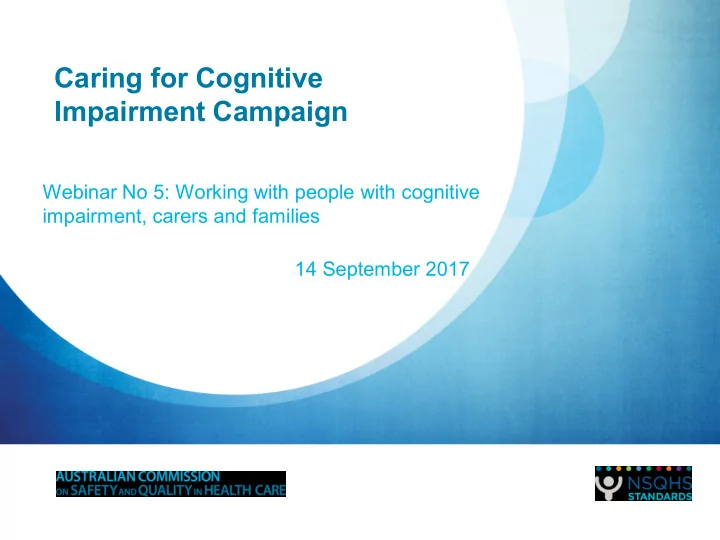

Caring for Cognitive Impairment Campaign Webinar No 5: Working with people with cognitive impairment, carers and families 14 September 2017
Overview • Brief context • Presenter, Anne Funke • NSQHS Standards • Question time
Cognitive impairment • Difficulties with communication, attention, memory, thinking and problem solving. • May be recent and temporary or permanent. • Cognitive impairment has many causes – dementia, delirium, acquired brain injury, a stroke or intellectual disability. • Dementia and delirium are common in older people in hospital. • Delirium is an acute change in mental status. It can be a treatable medical emergency. • Any form of cognitive impairment needs to recognised, understood and action taken.
Webinar No 5: Working with people with cognitive impairment, carers and families Presenter: Anne Funke, carer 14 September 2017
Meet Mitchell…
Angelman Syndrome • Characterised by severe intellectual disability, speech impairment, sleep disturbance, unstable jerky gait, seizures and usually a happy demeanour • Rare 1:20,000
Complex Health issues include • Epilepsy • Swallowing/feeding issues • Small head size • Seizures • Sleep disturbance • Scoliosis • Strabismus( crossed eye) • Balance/gait issues • Abnormal EEG • Challenging behaviours • Hypo pigmented skin, light hair &eye color compared to family
The world revolves around Mitchell!
Webinar No 5: Working with people with cognitive impairment, carers and families Video: A2D Together Folder, a user’s perspective 14 September 2017
NSQHS Standards (second edition) Clinical governance for health service organisations standard Partnering with consumers standard Healthcare-associated infection prevention standard Medication safety standard Comprehensive care standard Communicating for safety standard Blood and blood product standard Recognising and responding to acute deterioration standard
Within Comprehensive Care Standard – Cognitive impairment items .. A system for caring for patients with cognitive impairment to: a. incorporate best-practice strategies , including the Delirium Clinical Care Standard b. manage the use of antipsychotics and other psychoactive medicines, in accordance with best practice and legislation Clinicians use the system …to : a. recognise, prevent, treat and manage cognitive impairment b. collaborate with patients, carers and families to understand the patient and implement individualised strategies that minimise any anxiety or distress while they are receiving care
NSQHS Standards (second edition) Clinical governance for health service organisations standard Partnering with consumers standard Healthcare-associated infection prevention standard Medication safety standard Comprehensive care standard Communicating for safety standard Blood and blood product standard Recognising and responding to acute deterioration standard
Partnering with consumers in their own care • Informed consent • Substitute decision making • Sharing decisions and planning care • Partnership with patients and carers for active involvement
Webinar No 5 : Working with people with cognitive impairment, carers and families Q&A session : • Anne Funke, carer • Naomi Poole, Program Manager Partnering with Consumers 14 September 2017
Resources The Caring for Cognitive Impairment Campaign’s website is cognitivecare.gov.au The Commission has a patient and consumer centred care webpage Cognitive impairment: Intellectual disability • The NSW Agency for Clinical Innovation (ACI) has produced a series of videos to help health professionals understand the care needs of a person with intellectual disability. The following are relevant to hospital admissions: – Improving the experience of hospital for people with intellectual disability – Intellectual disability and hospitalisation by Lif O'Connor, Clinical Nurse Consultant • Admission to discharge - A2D website • Top 5 - website
Thank you
Recommend
More recommend